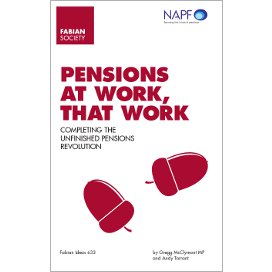Pensions at work, that work: Completing the unfinished pensions revolution
This pamphlet sets out a series of reforms to ensure that the occupational pensions in which most Britons save provide value for money.

- Pensions at work, that work
- Gregg McClymont , Andy Tarrant
- 13 May 2013
Typically when the left thinks of pensions, it thinks of the state old-age pension. The last Labour government focused on the poorest pensioners, adding pension credit to the basic state pension to ensure that for the first time in history, pensioners were not the age group most likely to be in poverty.
Less well known was the revolution in workplace pension saving that has taken place over the last decade. But this legacy will be of crucial importance to the next Labour government: nowhere does the idea of building a more ‘responsible capitalism’ resonate more strongly than in the world of workplace pensions.
Pension saving should deliver two things. First, a reasonable income in retirement for savers on a cost-effective basis. Second, savings should be invested in a way that develops the long-term capacity of the productive economy. The current British workplace pension system is flawed in both respects.
This pamphlet sets out a series of reforms to ensure that the occupational pensions in which most Britons save provide value for money. These reforms would not only lower the costs of saving, ensuring people a higher income in retirement, but also lead pension providers to favour the long-term, patient approaches to investment that are necessary to sustaining higher growth in the UK.
How to purchase
Copies are available, priced £9.95, from the Fabian Society. Call 020 7227 4900, email or send a cheque payable to The Fabian Society to 61 Petty France, London, SW1H 9EU.
Authors
Fabian membership
Join the Fabian Society today and help shape the future of the left
You’ll receive the quarterly Fabian Review and at least four reports or pamphlets each year sent to your door
Be a part of the debate at Fabian conferences and events and join one of our network of local Fabian societies
Join the Fabian SocietyBe the first to know
Sign up to the free Fabian Society newsletter
Find out about the latest Fabian Society research, publications and events with our regular updates
Sign up today
